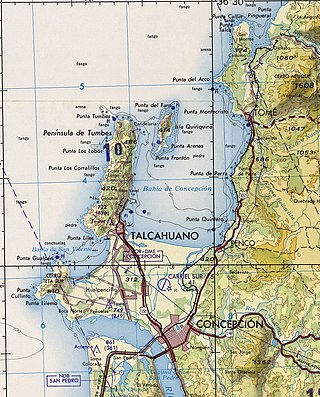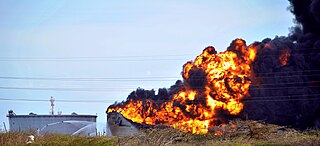Orimulsion is a registered trademark name for a bitumen-based fuel that was developed for industrial use by Intevep, the Research and Development Affiliate of Petroleos de Venezuela SA (PDVSA), following earlier collaboration on oil emulsions with BP.

Pemex is the Mexican state-owned petroleum company managed and operated by the Mexican government. It was formed in 1938 by nationalization and expropriation of all private oil companies in Mexico at the time of its formation. Pemex had total assets worth $101.8 billion in December 2019 and as of 2009 was Latin America's second largest enterprise by annual revenue, surpassed only by Petrobras. The company is the seventh most polluting in the world according to The Guardian.

Citgo Petroleum Corporation is a United States–based refiner, transporter and marketer of transportation fuels, lubricants, petrochemicals and other industrial products. Headquartered in the Energy Corridor area of Houston, it is majority-owned by PDVSA, a state-owned company of the Venezuelan government.

Repsol S.A. is a Spanish multinational energy and petrochemical company based in Madrid. It is engaged in worldwide upstream and downstream activities. In the 2021 Forbes Global 2000, Repsol was ranked as the 683rd-largest public company in the world. As of 2021, it has more than 24,000 employees worldwide.

Arturo Uslar Pietri was a Venezuelan intellectual, historian, writer, television producer, and politician.
Petróleos de Venezuela, S.A. is the Venezuelan state-owned oil and natural gas company. It has activities in exploration, production, refining and exporting oil as well as exploration and production of natural gas. Since its founding on 1 January 1976 with the nationalization of the Venezuelan oil industry, PDVSA has dominated the oil industry of Venezuela, the world's fifth largest oil exporter.

Petróleo Brasileiro S.A., better known by the portmanteau Petrobras, is a state-owned Brazilian multinational corporation in the petroleum industry headquartered in Rio de Janeiro, Brazil. The company's name translates to Brazilian Petroleum Corporation — Petrobras.

EP Petroecuador is the national oil company of Ecuador. Ecuador who is a member of the Organization of the Petroleum Exporting Countries (OPEC) and, although it is the smallest member, the country produced 531,000 barrels of crude oil per day in 2019. The oil corporation is a significant part of the Ecuadorian economy. The petroleum industry has expanded to the production of refined commodities such as gasoline, liquefied petroleum, and jet fuel. The government of Ecuador is highly dependent on the revenues from the energy sector to support its budget and finance state projects.

Petróleos del Perú(Petroperú), is a Peruvian state-owned company and private law dedicated to the transportation, refining, distribution and commercialization of fuels and other petroleum products. This company belonging to the Peruvian State since 1969, is considered among the main taxpayers to the treasury and currently employs more than 2,500 people. On the other hand, it makes important investments in education, health and other sustainable development projects throughout the Peruvian territory.
Venezuela has the largest conventional oil reserves and the second-largest natural gas reserves in the Western Hemisphere. In addition Venezuela has non-conventional oil deposits approximately equal to the world's reserves of conventional oil. Venezuela is also amongst world leaders in hydroelectric production, supplying a majority of the nation's electrical power through the process.

BP p.l.c. is a British multinational oil and gas company headquartered in London, England. It is one of the oil and gas "supermajors" and one of the world's largest companies measured by revenues and profits. It is a vertically integrated company operating in all areas of the oil and gas industry, including exploration and extraction, refining, distribution and marketing, power generation, and trading.

San Juan River is a river in Sucre and Monagas states, north-eastern Venezuela. Its eastern part forms the limit between both states before it flows into the Gulf of Paria. The Guarapiche River flows into a short body named Caño Francés that flows into the San Juan shortly before its mouth in the Gulf of Paria. In February 2012 there was an oil spill in the mangrove area at the mouth of the river.

The Paraguaná Refinery Complex is a crude oil refinery complex in Venezuela. It is considered the world's third largest refinery complex, just after Jamnagar Refinery (India) and Ulsan Refinery. The Paraguaná Refinery Complex was created by the fusion of Amuay Refinery, Bajo Grande Refinery and Cardón Refinery. The Paraguana Refinery Complex is still the largest refinery in the Western Hemisphere. As of 2012, it refined 955 thousand barrels per day (151,800 m3/d). The complex is located in the Paraguaná Peninsula in Falcón state and the western coast of Lake Maracaibo in the Zulia state. The complex accounts for 71% of the refining capacity of Venezuela and it belongs to the state-owned company Petróleos de Venezuela (PDVSA).

On 7 June 1978, the Chilean Oil tanker Cabo Tamar ran aground at San Vicente Bay, near Talcahuano, Chile, and released 12,000 tons of oil.
The following lists events in the year 2020 in Venezuela.
Despite having the largest oil reserves in the world, Venezuela has experienced fuel shortages several times throughout its history due to both economic and political reasons. The general strike of 2002–2003 resulted in the stoppage of the oil industry, which caused fuel shortages domestically, and Nicolás Maduro's administration has experienced chronic gasoline shortages.

FSO Nabarima is a floating storage and offloading vessel that is permanently moored offshore of Venezuela at the Corocoro oil field in the Gulf of Paria, located between Venezuela and the island of Trinidad. After production at Corocoro ceased in 2019 following United States sanctions on the Venezuelan state oil company Petróleos de Venezuela (PDVSA) and following years of neglect, Nabarima fell into a state of disrepair, and was reported in 2020 to be at risk of spilling her cargo of about 1.3 million barrels of crude oil.

The 2022 Callao oil spill is a crude oil spill that occurred on 15 January 2022, on the coast of the Ventanilla district in the constitutional province of Callao, Peru, after abnormal waves caused by the volcanic eruption in Tonga and alleged negligence on the side of company Repsol. It has been qualified by the Environmental Assessment and Control Agency as the greatest ecological disaster that has occurred in Peru.

The Amuay tragedy was an explosion of the Paraguaná Refinery Complex in Punto Fijo, Venezuela. The explosion resulted in the death of 48 people and injured 151 others.














